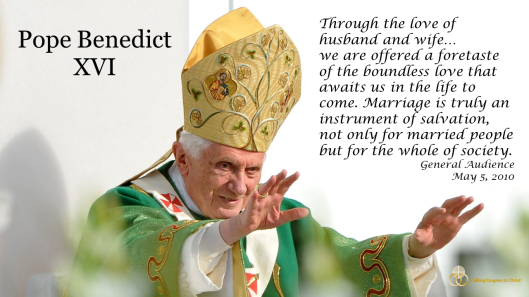
On this the Palm Sunday of the Lord’s Passion, we continue our reflections on the Theological Virtues of Faith, Hope, and Love. This week we will continue to look at the virtue of love.
Love between man and woman cannot be built without sacrifices and self-denial.[1] St. John Paul II
It our modern culture, suffering is to be avoided at all costs. The Christian idea that one “should suffer well,” uniting one’s suffering to the suffering of Christ on the cross, is thought to be the antithesis of a life worth living.
Then Joseph Cardinal Ratzinger, in an interview with Peter Seewald, entitled The Question of Suffering, the Response of the Cross,[2] had this is say about love, suffering, and self-sacrifice…
Today what people have in view is eliminating suffering from the world. For the individual, that means avoiding pain and suffering in whatever way. Yet we must also see that it is in this very way that the world becomes very hard and very cold. Pain is part of being human. Anyone who really wanted to get rid of suffering would have to get rid of love before anything else, because there can be no love without suffering, because it always demands an element of self-sacrifice, because, given temperamental differences and the drama of situations, it will always bring with it renunciation and pain.
When we know that the way of love–this exodus, this going out of oneself–is the true way by which man becomes human, then we also understand that suffering is the process through which we mature. Anyone who has inwardly accepted suffering becomes more mature and more understanding of others, becomes more human. Anyone who has consistently avoided suffering does not understand other people; he becomes hard and selfish.
Love itself is a passion, something we endure. In love we experience first a happiness, a general feeling of happiness.
Yet on the other hand, I am taken out of my comfortable tranquility and have to let myself be reshaped. If we say that suffering is the inner side of love, we then also understand it is so important to learn how to suffer–and why, conversely, the avoidance of suffering renders someone unfit to cope with life. He would be left with an existential emptiness, which could then only be combined with bitterness, with rejection and no longer with any inner acceptance or progress toward maturity. (emphasis added)
To love is to sacrifice one’s own needs and desires for the good of the other. Out of love, Christ died on the cross for the forgiveness of our sins, that we may share eternal bliss with His Father for all eternity. True love gives, even when and most especially, when it hurts. The true measure of love is the extent that one will give his or her life for another. Self-sacrifice and self-denial are key in marriage and family life. When love and sacrifice is missing, marriage and family life becomes sterile and lifeless.
Jesus is our model of self-sacrificial love. St. Paul in his letter to the Ephesians says, “Husbands, love your wives, as Christ loved the church and gave himself up for her” (Eph 5:25). As the spiritual leaders of their homes, husbands and fathers are to model Christ’s love for His Bride, the Church. Your wife and your children will see the love of God through your selfless gift of yourself for their good.
More than 50 years ago, it was common for the Priest to proclaim an Exhortation before Marriage to the couple before the recitation of their wedding vows. One line in particular from the Exhortation speaks profoundly of the importance of self-sacrificial love:
Sacrifice is usually difficult and irksome. Only love can make it easy, and perfect love can make it a joy.[3]
This is our call in the vocation to marriage and family life. Love is built on sacrifice and self-denial. Make it your aim as husband and wife to outdo each in self-giving love.
May the Lord bless you richly now and always.
Note: Prior reflections in this series on the Theological Virtues of Faith, Hope, and Love can be found at the links below:
1st Sunday in Lent: The Theological Virtue of Faith
2nd Sunday in Lent: The Theological Virtue of Faith – Part 2
3rd Sunday in Lent: The Theological Virtue of Hope
4th Sunday in Lent: The Theological Virtue of Hope – Part 2
5th Sunday in Lent: The Theological Virtue of Love
[1] Karol Wojtyla (St. John Paul II), Love and Responsibility (San Francisco: Ignatius Press, 1981), 208.
[2] Joseph Cardinal Ratzinger (Pope Benedict XVI), God and the World: A Conversation with Peter Seewald (Ignatius Press, 2002), pages 332-36, 333.
[3] The Exhortation Before Marriage, from the 1961 Collectio Rituum, http://missale.heliohost.org/nuptial.html (accessed April 8, 2019).
